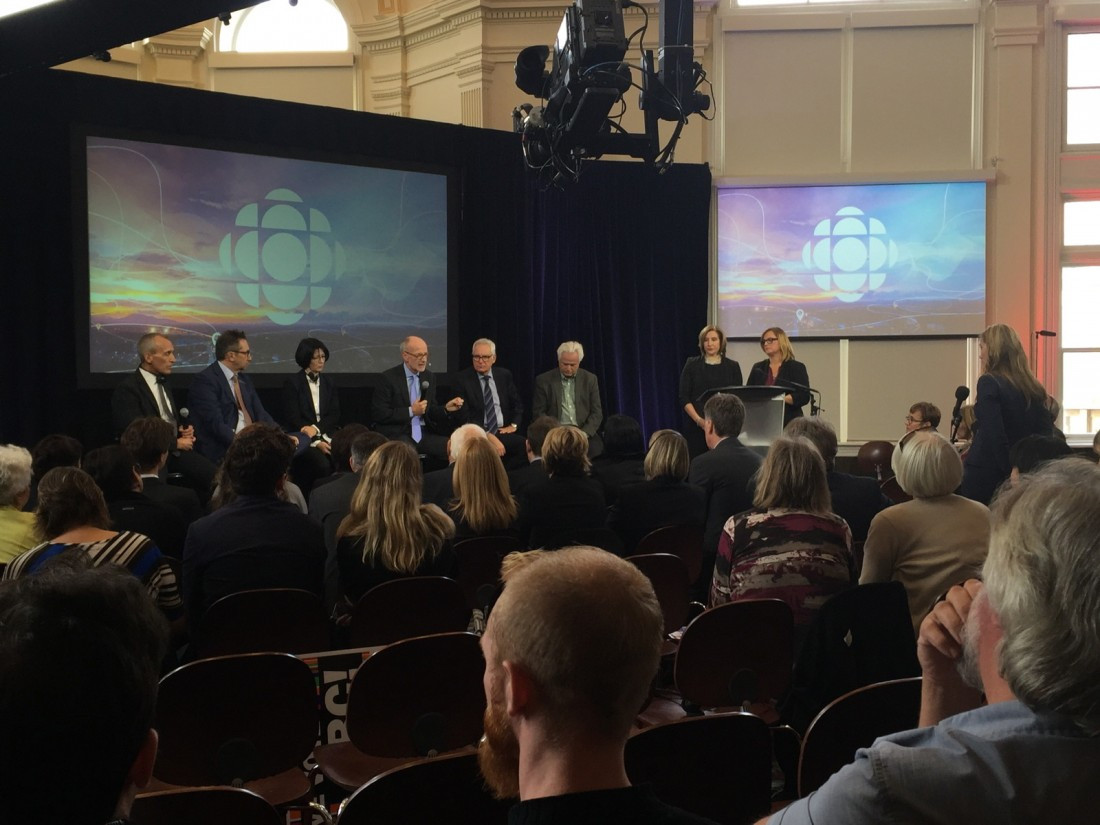Keep the local beat going
On Sept 29, CBC/Radio-Canada held their Annual Public Meeting (APM) at the University of Winnipeg (U of W). Earlier in the day, CBC/Radio-Canada president Hubert Lacroix met with The Uniter and Le Réveil to share his thoughts about the CBC, the current state of journalism and the job market for young reporters.
Many in the audience at the APM wondered about the future of the broadcaster after recent rounds of cuts. Lacroix reframed this as a “transformation” toward a digital model of business, adding that they hoped to reach 18 million Canadians through digital platforms by 2020.
Lacroix acknowledged that this changes reporters’ workload by adding social media to their reporting, but that it is the broadcaster’s responsibility to ensure that journalists are prepared and trained for engaging with faster moving platforms.
“If we can’t help you, it’s not your fault. It’s ours,” Lacroix said. With proper skills, he believes reporters can save time by filing and editing from the field.
James Turner, a journalism instructor at Red River College, has seen the push towards social media being taken up slowly in Winnipeg. If they had started preparing for the change towards social media a few years back, reporters would be more prepared, Turner says.
“Reporters, not necessarily the ones coming out of school now, but the ones who’ve been on the job for 5 or 6 or 10 years, would be a little more comfortable with their social media presence and how to use it to their advantage,” Turner said.
“I don’t think it’s any secret with revenues declining that more people are being asked to do more with less,” Turner said, “However, there are ways to adapt your reporting so that you can leverage social media to its best advantage.”
Hubert spoke to this decline in revenues, and also called for a new revenue model to support this digital dream, which he called “a modern public space, free from government, free from corporate and commercial interests.”
“We’re going to start a conversation about our future. A future with you. About the changes that are happening in the way you consume our content, our services,” Lacroix said. “And we’re all going to have to decide how we fund this.”
“Can we fund it in a different way? ‘Cause without a robust and stable funding model, all the things that we are trying to do at CBC/Radio-Canada, they will be hostage to the need to manage the financial emergency of the moment.”
Given this shifting climate in journalism, what can writers for smaller publications like The Uniter do to step up and improve their coverage?
“Local stories will always be important and crucial to the country,” Lacroix says. He emphasized that understanding our world from a local context, and sharing those stories nationally, is how we build “cohesion of the country.”
Lacroix commented that media organizations can’t go it alone anymore, and that partnerships are necessary. He’s found himself in more collaborations than ever before. “We can’t live on a little island,” Lacroix said.
There was no island at the APM, and audience members were quick to engage Lacroix and his fellow panelists in conversations about CBC/Radio-Canada’s programming, rumours of selling off old buildings and CBC’s relevance to younger audiences.
A panel including CBC/Radio-Canada President Hubert Lacroix field questions from the audience at the APM.
Lacroix reassured the audience that “there’s no fire sale going on,” rather, that CBC/Radio-Canada is hoping to better use the spaces they have and become more compact. His fellow panelist, Heather Conway, promised updates for the CBC online player.
Turner believes that the CBC has come a long way in terms of relating to a younger market.
“I have seen through their web presence, and through their leveraging of Facebook and Twitter, other sort of popularized social media types of ventures, I see them actually becoming more relevant to a younger audience,” Turner said. “And the fact that it’s free and not behind a paywall doesn’t hurt either.”
But Turner also highlighted the difficulties that can come with trying to introduce a new direction to a national public broadcaster.
“The problem I see with the CBC is that it’s just this massive ship that you’re trying to steer towards the digital future, that’s really their biggest challenge I think,” Turner said. “It’s kind of hard to remember how large the CBC is, even though they’re fewer than they used to be, there’s still a lot of people that work there.”
The tension between old work models, the recent memory of staffing cuts and the direction proposed by Lacroix was evident in question posed by an audience member who identified herself as a reporter and member of the Canadian Media Guild (CMG).
“For the first time here, you’re very clear that the CBC is in crisis. And I have two questions: what brought about your change of heart, and what are your plans to address it?” she asked. The CMG member also stated that many federal candidates have pledged to reverse $115 million dollars in funding cuts if they were re-elected.
“We’ve had this conversation many times before,” Lacroix responded. “It’s not the first time we’ve interacted on the subject matter, and she will get the same answer she’s unfortunately received all these times. So there’s no surprise here either.”
Lacroix stated that he had made speeches as far back as 2008 that addressed how “we’ve always been fighting for the environment in which we are,” and again emphasized the challenges of a changing market and shrinking resources.
“If ever dollars came to us, we’re not going back to the CBC of the years behind. We would accelerate the changes we’re doing. We would accelerate the virage, the technological and the move towards digital,” Lacroix concluded. “We would accelerate this, and not go back to where we were before. We can’t go back. And we won’t.”
Earlier in the day, The Uniter asked Lacroix about job prospects for current and future journalists. He stated that after 16 positions were cut in Winnipeg, 8 positions were created, reflecting this shift towards digital positions.
Lacroix encouraged young journalists to become multi-skilled and familiar with different platforms, but not to underestimate basic writing skills or the ability to tell stories. “There will be jobs,” Lacroix stated.
Turner has no doubt that there will be jobs, and stated that every single one of his grads from last year is working in journalism or communications. However, young reporters may need to adjust their career expectations.
“When I left school, there was still that mentality that I’m going to work at some big place like CBC or the Free Press or whatever, and they’re going to take care of me for the rest of my life,” Turner said.
“So what I try to counsel people to do is think entrepreneurially, and find a subject area that they’re really passionate about. Go out and do journalism in that area, and become a subject area master in that, and bolster your own credibility and practice in that field. And employers will take notice, they really do.”







